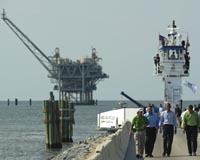 |
New York (AFP) July 9, 2010 Fed up with the uncertainty surrounding offshore drilling following the Gulf of Mexico disaster, oil companies are considering increasing their inland exploration activities or venturing abroad. President Barack Obama imposed a moratorium on deepwater drilling after a deadly explosion on a BP-leased rig in April caused a devastating spill of crude into the gulf that has imperiled fragile coastlines and wildlife. But a federal judge blocked the moratorium last month after 32 oil companies and local officials argued it was causing irreparable economic harm. A court on Thursday denied the Obama administration's bid to stay that judge's order pending appeal. Amid the legal uncertainty, oil companies remain in limbo. The Obama administration had also signaled that a new order will be issued soon to block deepwater drilling regardless of how the court ruled. With their crews and equipment idled since the moratorium was issued in May, oil companies are considering moving their drilling operations inland or abroad. "If the moratorium is relatively long, you'll see assets leave the Gulf of Mexico, and go to Brazil, or West Africa and it will take some time to take these assets back to the Gulf of Mexico," said Gary Flaharty, spokesman for Houston-based oilfield services company Baker Hughes. He said companies which moved abroad could stay there for sometime. "If they pay for mobilizing a rig in Brazil or West Africa, I don't think it will be for a single well, so it could be an extended period of time before we get back to a normal activity level in the Gulf of Mexico," Flaharty said. Anadarko Petroleum, which owns 25 percent of BP's blown-out well, said it was "evaluating opportunities" to reallocate some of its 2010 capital from the gulf to other areas, including onshore liquids-rich areas such as Wattenberg in Colorado, the Maverick Basin in South Texas and the Bone Spring play in East Texas. For US giant ExxonMobil, if the moratorium remained, "we will need to redirect our human resources -- the technical talent -- to other parts of the world where we are allowed to work," said company spokeswoman Cynthia Bergman White. "We will also redirect rigs and equipment elsewhere. It is too expensive not to do so." ExxonMobil faced delay in plans to drill an exploration well at the Hadrian prospect at oil-rich Keathley Canyon in the Gulf of Mexico scheduled to begin the week of May 10. Preparations to drill at the Hoover Diana platform in the gulf have also been suspended. The uncertainty has made increasing investment on onshore drilling a "natural consequence," said James Williams, oil analyst at WTRG Economics. "Typically, if you have an exploration budget, and you can't drill in one area, you still need to offset your decline in production by drilling new wells, and if you have opportunities onshore, you have to take them," he said. Onshore drilling activities in the United States have already doubled over the last year or so but the pace in recent months has been rapid. Of the 587 rigs drilling for oil, 580 are based onshore compared with just 225 a year ago. "That was happening anyway but the pace in the last two or three months has been very strong," Williams said. Bruce Vincent, chairman of the Independent Petroleum Association of America, which has almost 5,000 members, is more concerned about the additional costs to be incurred due to stringent regulations following the BP disaster that has led to two to four million barrels of oil so far into the Gulf waters. "What will happen is regulators will build in even more redundancy," he said. "You'll need more equipment. You'll need to have it inspected more often. You'll probably need more people on site -- certainly higher qualified people -- that will take more manpower. All of that will add cost and expense."
Share This Article With Planet Earth
Related Links Powering The World in the 21st Century at Energy-Daily.com
 Obama loses drilling moratorium appeal
Obama loses drilling moratorium appealNew Orleans, Louisiana (AFP) July 9, 2010 The Obama administration lost its bid to keep a six-month freeze on offshore drilling, and BP was to outline Friday its next steps to cap the well gushing oil into the Gulf of Mexico. A federal judge blocked the deepwater drilling moratorium last month after 32 oil companies and local officials argued it was causing irreparable economic harm. The Fifth Circuit Court of Appeals on Thursda ... read more |
|
| The content herein, unless otherwise known to be public domain, are Copyright 1995-2010 - SpaceDaily. AFP and UPI Wire Stories are copyright Agence France-Presse and United Press International. ESA Portal Reports are copyright European Space Agency. All NASA sourced material is public domain. Additional copyrights may apply in whole or part to other bona fide parties. Advertising does not imply endorsement,agreement or approval of any opinions, statements or information provided by SpaceDaily on any Web page published or hosted by SpaceDaily. Privacy Statement |